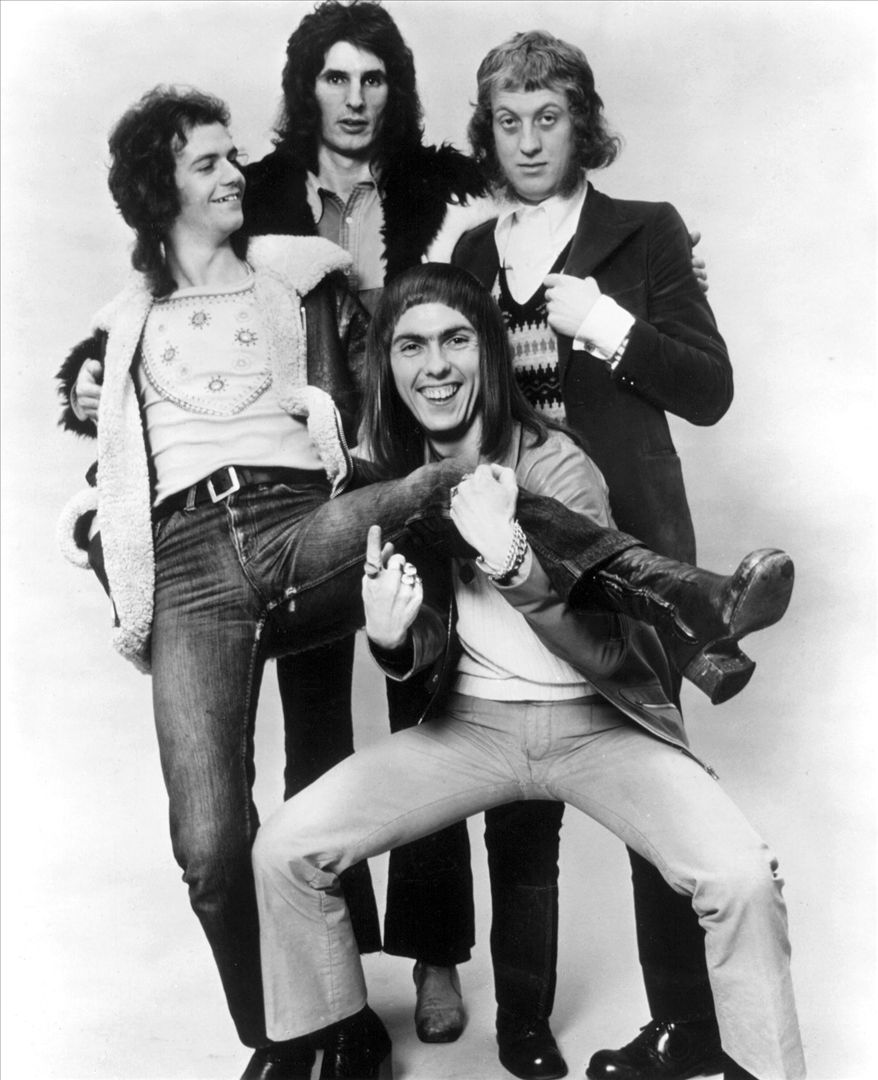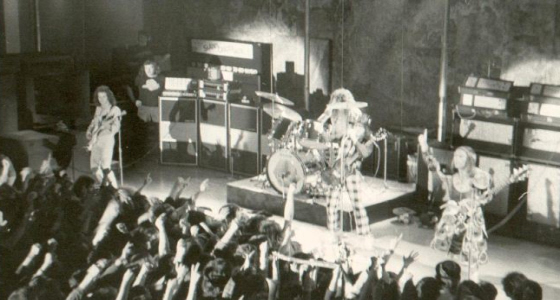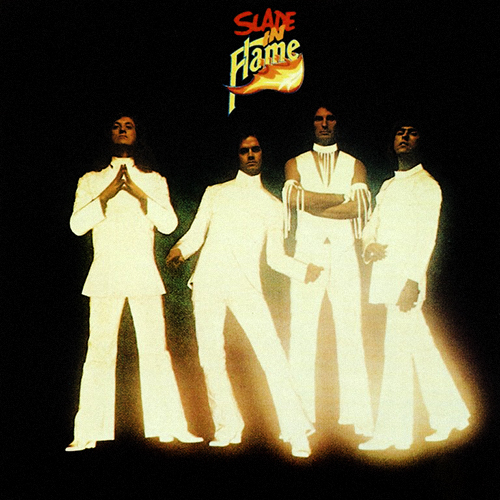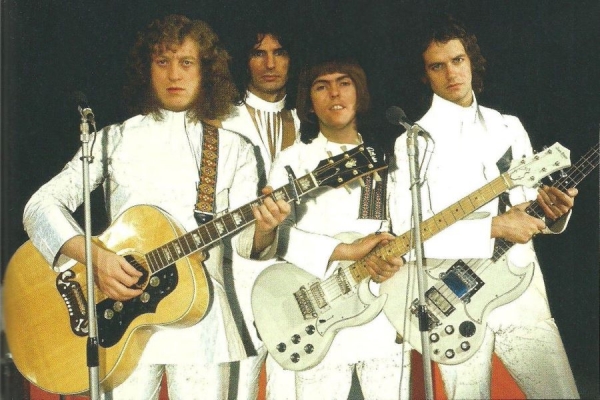Slade in Flame
Written by Matteo SedazzariAt the height of their popularity in 1974, their then manager, Chas Chandler (former bass player of The Animals and former manager of Jimi Hendrix), suggested Slade do a film.
Perhaps trying to emulate the success of The Beatles with A Hard Day's Night and Help at the height of Beatlemania, it seemed a logical step that The Black Country's answer to Merseyside's Fab Four should follow suit.
By the early 1970s, Slade had conquered the UK, the country was in the midst of Slademania and they had become the natural successor to The Beatles, with six number-one singles, and two number one albums in the UK all by the close of 1974. Yet, unlike John, Paul, George, and Ringo, Noddy, Dave, Jim, and Don had not conquered the US. Slade hadn't had an early epitomising TV appearance like performing on the Ed Sullivan Show that made The Moptops an overnight success in the US. So maybe Chandler felt that if Slade made a film, it would help them to get them a number one over there – a prize that had eluded them so far. With the announcement of the film, the fans and public alike waited in anticipation. With Slade being perceived as a 'good times' band, many felt the fun and frolics would follow them to the silver screen. Instead, the band decided to a U-turn, and go against its public image as The Monkees had done with Head in 1968 when the US's answer to The Beatles, The Monkees, decided not to have 90 minutes of zany humour but instead a surreal adventure parodying themselves. It would be many years before Head received cult status.
With the announcement of the film, the fans and public alike waited in anticipation. With Slade being perceived as a 'good times' band, many felt the fun and frolics would follow them to the silver screen. Instead, the band decided to a U-turn, and go against its public image as The Monkees had done with Head in 1968 when the US's answer to The Beatles, The Monkees, decided not to have 90 minutes of zany humour but instead a surreal adventure parodying themselves. It would be many years before Head received cult status.
The film Flame is about the rise of the band (Flame) from the Midlands in 1966, and all the trappings of fame. Charlie – drummer (Don Powell), Paul – bass (Jim Lea), Barry – lead guitar (Dave Hill), Stoker – lead vocals and rhythm guitar (Noddy Holden), are semi-professional musicians performing at weddings and working men's clubs; Paul and Barry are performing covers with Jack Daniels (Alan Lake, who married the late and great Diana Dors), whilst Stoker is playing with a novelty band, The Undertakers. There is no love lost between these bands, in fact, a great deal of rivalry. However, after a few personnel changes, Daniels is sacked and replaced by Stoker, and Flame is born. After a few successful gigs, the band catch the attention of Robert Seymour (Tom Conti), an investment banker who sees music as a great opportunity to make some hard and fast cash via music.
Yet Flame is handled by no messy agent Ron Harding (Johnny Shannon), whose office is above a Bingo hall and seems to be always shortchanging the band, which results in both parties going their separate ways.
When Paul shows Stoker Seymour's letter of intent in Stoker's pigeon loft, Stoker merely shrugs his shoulders, and says they are the same as Harding's agency, and the difference is that have they "got better notepaper". However the rest of the band, persuade Stoker, and they sign to Seymour, who invites them to his prestigious offices in London. When Seymour is telling Flame about how he wishes to package the band, Paul drolly replies, "I'm not a bloody fish finger". Short and sweet sentences from the band, yet, they both sum up perfectly the ruthless and marketing over music culture that is so paramount in many record companies.
Moreover, this overall concept of Flame is an insight into the trappings of the music industry, yet also the film illustrates how music is a great escape for a working-class lad, whose only other options include the local steel mills or market trading. So the film does have a sense of optimism which is short-lived when Flame starts to swing with the sharks. Moreover, their troubles are worsened when it appears they are still under contract to Harding. Both parties had failed to terminate the contract and now the wheeler-dealer wants a piece of their big pie as Flame is becoming a huge chart success. However, Seymour will do anything to stop this. As a viewer, we observe the growing tension of the band which leads to a dramatic and poignant crescendo at an after-show party at The Grand Hotel Brighton (an iconic hotel from The Who's Quadrophenia), which is like the fall of the Roman Empire as the film comes to a close when Stoker is confronted by their former manager in the morning and Stoker ends the film with the statement "we have all had enough". Long pause, then the credits roll, and we are left with a lingering thought about the brutal world of the music industry.
Flame is closer to the Free Cinema movement, A Taste of Honey, This Sporting Life, due to its gritty and documentary style of storytelling. Perhaps the public was expecting a 1970s sex comedy like Confessions of A Window Cleaner and was hugely disappointed. Yet Flame is an amazing study of the trappings of a band, and has been and still is underrated, as a great piece of British cinema. With regard to Slade's acting, it is perfect for the film, lines are delivered well and Noddy, Dave, Jim, and Don are naturalistic and able to create empathy for their role. It was brave for the band, to expose their world and not use the film as a marketing tool – maybe like Flame, they too had had enough.
It has been documented that this film perhaps was the downfall of Slade, maybe, but the original line up of Slade recorded and played together right until 1992. So this film was far from their downfall, Glam Rock was coming to end and Punk Rock was on the horizon, as was a new generation. The UK has always had a great history of changing tastes in music, and by the mid-70s, the taste of Slade was no longer sweet.

Matteo Sedazzari
Latest from Matteo Sedazzari









